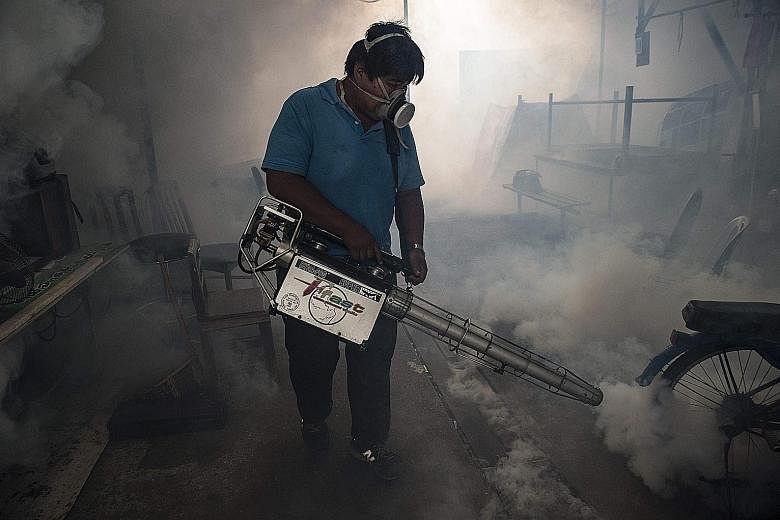BANGKOK • Thailand is investigating four suspected cases of Zika-related microcephaly in three babies and a 36-week-old unborn baby, in what could be the first such cases in South-east Asia.
Several countries in the region have reported increasing cases of infection from the mosquito-borne Zika virus but Thailand has one of the highest numbers in the region, with 349 confirmed since January, including 25 pregnant women.
Public Health Minister Piyasakol Sakolsatayadorn yesterday said the authorities needed to be thorough in their investigation of the cases as confirmation would be "sensitive".
The results will be out on Friday, Public Health Ministry permanent secretary Sopon Mekthon said .
US health officials have concluded that Zika infections in pregnant women can cause microcephaly in babies, a birth defect marked by small head size that can lead to severe developmental problems.
Mr Piyasakol said the three babies were born with small heads and an ultrasound appeared to indicate the unborn baby also has a small head.
Of the four mothers, two were diagnosed with Zika when they were pregnant but two were not confirmed to have had Zika, said Dr Apichai Mongkol, director-general of the ministry's Department of Medical Sciences.
There are no specific tests to determine if a baby will be born with microcephaly, but ultrasound scans in the third trimester of pregnancy can identify the pro- blem, according to the World Health Organisation (WHO).
Dr Amnuay Gajeena, the director-general of Thailand's Disease Control Department, said the four cases were being monitored. He declined to say where the women were suspected of contracting the virus, but said "it is not in Bangkok".
If confirmed, the Thai case or cases of Zika-linked microcephaly would be the first in South-east Asia, the WHO said in a statement.
The Zika-microcephaly link first came to light last year in Brazil, which has confirmed more than 1,600 cases of microcephaly that it considers to be related to Zika infections in the mothers.
Some health experts have accused Thailand, which has a thriving tourist industry, of playing down the risk from Zika.
But officials have dismissed that, saying the response has been adequate and another mosquito-born disease, dengue, which can be deadly, is a bigger threat.
The WHO lists Singapore, the Philippines, Malaysia, Thailand and Vietnam as countries in the region reporting new cases of Zika.
It has also said there is strong scientific consensus that Zika can lead to Guillain-Barre, a rare neurological syndrome that causes temporary paralysis in adults.
According to the WHO, there are two major lineages of Zika - an African lineage, which has only been reported in Africa, where the virus was first discovered in 1947, and an Asian lineage of strains.
There is no vaccine or treatment for Zika, which is a close cousin of dengue and chikungunya and causes mild fever, rash and red eyes. An estimated 80 per cent of people infected have no symptoms, making it hard for pregnant women to know if they have the virus.
REUTERS, THE NATION/ASIA NEWS NETWORK

